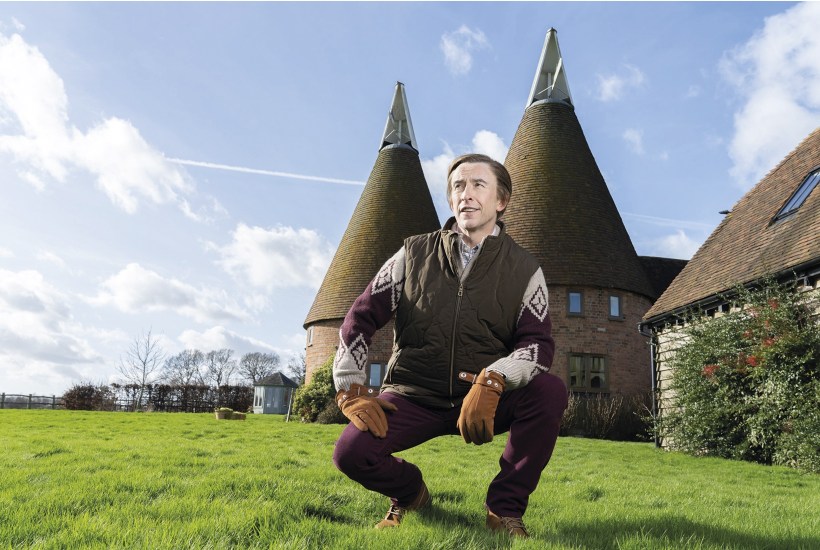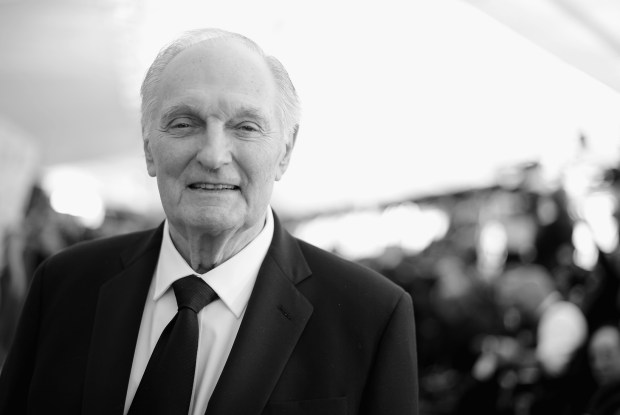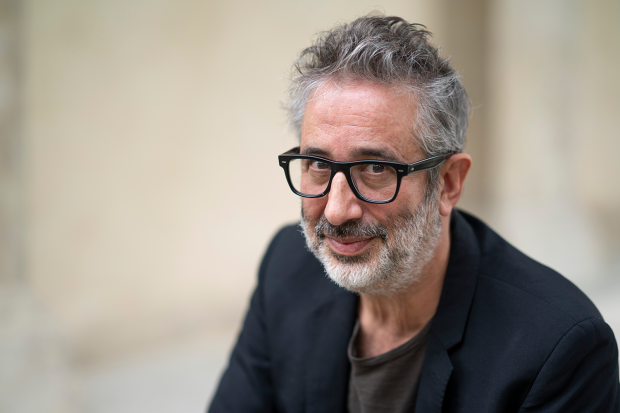In the week Jenni Murray left Woman’s Hour, I was listening to Alan Partridge on his new podcast, From the Oasthouse, and imagining what he might have been like as her successor. As I chuckled through half a dozen episodes of awkward Norfolk frippery, it occurred to me that, short of taking him on, the BBC could do wonders for its reputation in the wake of Murray’s departure by taking a leaf out of the Partridge playbook.
Partridge, played by Steve Coogan since 1991, has moved with the times. Although he hasn’t changed, his horizons have, and he is doing his best to retain his cringe-inducing record. Ousted from his radio station following ‘an issue with a colleague’, and crippled by the mortgage on his seven-bedroom home, he has down-sized to a mock ‘oast-style’ house from which he is now streaming an 18-part series on his life. Fed up with dating women who turn their cheek when he tries to kiss them (‘It’s like trying to snog an owl’), he has joined an elite dating service.
In the third episode he is matched with a professional dog-groomer (‘Let’s call her Janet because she looks like one’). We don’t hear much about the date, or about her, other than how she scores out of ten. ‘To divulge more,’ he adds, ‘would be to objectify her.’ The progress of women and the challenges of approaching them in 2020 is the major preoccupation of the series. When Partridge’s assistant Lynn becomes unwell, he puts out an advertisement for a replacement, incorporating #MeToo into the wording ‘to show which side of the Weinstein fence’ he’s on.
The podcast is as funny as you would expect it to be. I particularly enjoyed Partridge’s ideas about who should be the next James Bond: split the character in two and have Idris Elba play ‘Jack James’ and do all the running and fighting bits, and Tom Hiddleston play ‘Brian Bond’ and do all the swaggering bits. Or, failing that — one can’t ‘be that prickly about accurately casting the role of a quintessential Englishman when you’ve already given it to a Scottish chap’ — employ an actress. ‘If a woman wants to swim after it, chuck her in, and let her.’
None of these topics would be out of place on Woman’s Hour. In fact, most of them have already been discussed on the programme, only with serious intent. Hearing them through Partridge, the least woke man in Britain, only magnified them in my mind’s eye. Sometimes you’ve got to hear a contrarian view to appreciate where you stand and realise how much you care.
The question of how far the BBC has changed during Jenni Murray’s 33 years at Woman’s Hourwas never far away as she reflected on advances in women’s lives in her final programme. In some ways the organisation is unrecognisable from the one she walked into in 1987. And yet, as Murray wrote in an article last weekend, she has been shocked in recent years by her employer’s refusal to fight her corner on a number of issues, even after she received threats of violence. Partridge’s words began to ring in my ears: ‘Chuck her in.’ Or, maybe, out; Murray has described herself as being ‘cancelled’.
The circumstances surrounding her departure have angered many of those the BBC is most eager to engage. The last thing young people, especially ambitious young women, want to see is other women being chucked — to the tweeting wolves, to the mob, to the curb — even if they disagree with their views. If only the BBC could harness the freedom of comedy — of Partridge — it would bolster its appeal, and bring the seriousness of the problems it debates more effectively into our wearied consciousness. There is, for us, no doubting the continuing need for a dedicated women’s radio programme. We shall rally behind Emma Barnett as she takes up the reins in the hope that, with a bit of roasting and light seasoning, some proverbial Partridge may be allowed back on the menu.
To mark what would have been John Lennon’s 80th birthday on 9 October, his son Sean talked to half-brother Julian, godfather Elton John and Paul McCartney for Radio 2. He was just five when his father was killed, but his bond with him was clear, especially when he described what it was like to grow up surrounded by his fans. The most poignant moment came when he wished that John Lennon could speak for himself. All the time, Sean said, people tell him what they think his father would say on this or that. But as he reflected, Lennon was forever changing his mind, updating his opinion, evolving, so you could guarantee that, whatever he was thinking, it wasn’t what anyone thought it was.
Got something to add? Join the discussion and comment below.
Get 10 issues for just $10
Subscribe to The Spectator Australia today for the next 10 magazine issues, plus full online access, for just $10.
You might disagree with half of it, but you’ll enjoy reading all of it. Try your first month for free, then just $2 a week for the remainder of your first year.














Comments
Don't miss out
Join the conversation with other Spectator Australia readers. Subscribe to leave a comment.
SUBSCRIBEAlready a subscriber? Log in